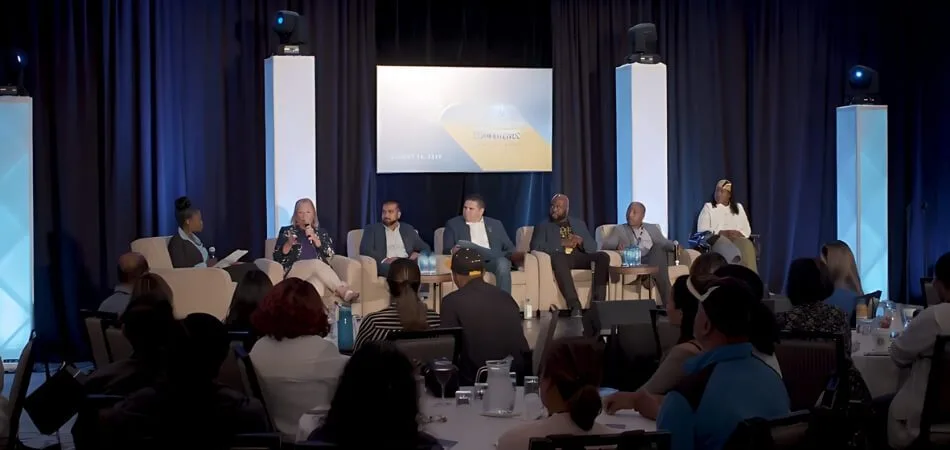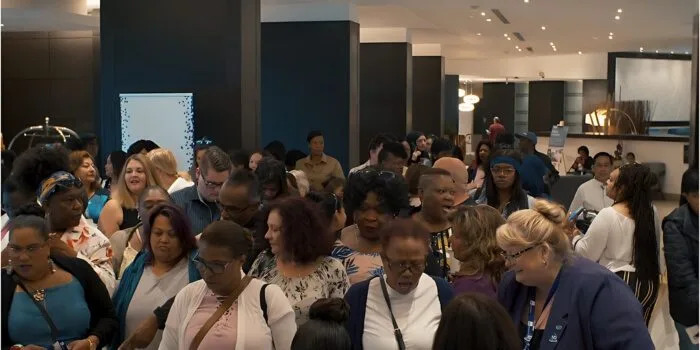Attending a human rights conference can be a powerful way to stay informed and engaged in global issues that matter. If you’re wondering how to find a human rights conference to attend, the process is easier than you might think. It’s easy to find events centered around your interests and passions if you do a little research.
Start by exploring online directories, human rights organizations, and academic institutions. Many of these sources list upcoming conferences, both in-person and virtual. Additionally, social media platforms and professional networks can offer valuable leads on relevant events.
Are you looking for ways to find the right human rights conference for you? Keep reading to find out how to connect with the global human rights community.
The Purpose of the Human Rights Conference
The purpose of a human rights conference is to bring together people from various backgrounds—activists, researchers, policymakers, and professionals—to discuss and address pressing human rights issues. These conferences create a platform where participants can share knowledge, exchange ideas, and collaborate on ways to promote and protect human rights globally.
One of the main goals of a human rights conference is to raise awareness about specific human rights challenges, such as gender equality, freedom of expression, or the rights of marginalized communities. By providing a space for dialogue, these events encourage people to think critically about current human rights issues and potential solutions.
Human rights conferences also serve as a great opportunity for networking. They allow participants to connect with others who are working in the same field, forming partnerships and collaborations. Whether you’re an experienced advocate or new to the field, these conferences help you expand your knowledge and contribute to the global conversation on human rights.
Overall, the purpose of a human rights conference is to inspire action, build connections, and work towards a world where everyone’s rights are respected and protected.
How to Find a Human Rights Conference to Attend?
Attending a human rights conference can be an enriching experience, offering insights into global issues and the chance to connect with like-minded individuals.
If you’re wondering how to find a human rights conference to attend, the process is straightforward. Start by identifying your interests in the field, as this will guide your search for relevant events.
Let’s break down the key steps to help you find the perfect conference.
Step 1: Define Your Interests
The first step in finding the right human rights conference is to define your interests. Human rights cover a wide range of topics, from gender equality and racial justice to environmental rights and refugee issues. Knowing what resonates with you will help guide your search.
Once you’ve identified your focus, it becomes easier to target events that align with your passions. This clarity will not only save time but also ensure you choose a conference that truly enriches your knowledge of the issues you care about.
Step 2: Research Online
Researching online is one of the easiest ways to find upcoming human rights conferences. Websites like Global Conference provide a comprehensive list of international events that can match your interests. Be sure to check these sites regularly to stay updated on new opportunities.
In addition to event websites, social media platforms like Twitter or LinkedIn can be great resources. Follow organizations and thought leaders in human rights to get real-time updates on conferences and networking events tailored to your needs.
Step 3: Check Organizational Websites
Exploring the websites of organizations that align with your interests is a great way to find relevant conferences. Many human rights organizations host or promote conferences as part of their advocacy efforts. These events can provide valuable insights and opportunities for networking.
By regularly checking their websites, you’ll stay updated on upcoming events, keynote speakers, and registration details. It’s a simple yet effective way to find conferences that resonate with your passion for human rights and global advocacy.
 Step 4: Networking
Step 4: Networking
Networking is a powerful tool when looking for human rights conferences to attend. Start by reaching out to professionals in the field through platforms like LinkedIn or Twitter, where you can connect with activists, academics, and organizers. These connections often lead to personal recommendations for upcoming events.
Additionally, join human rights groups or engage in online forums. These communities are full of valuable information and insider tips about conferences, helping you discover opportunities you might not find through traditional searches.
Step 5: Consider Location and Accessibility
When choosing a conference, it’s important to consider the location and how accessible it is for you. Think about travel expenses, visa requirements, and whether flights and accommodations fit within your budget. This will help you avoid unnecessary stress later on.
Also, check if the conference is conducted in a language you’re comfortable with. If it’s not in your native language, see if translation services are available to ensure you can fully participate and engage with the sessions.
Step 6: Review the Agenda and Speakers
Before attending the conference, take time to thoroughly review the agenda and speakers. This will give you a clear idea of the sessions, workshops, and discussions that best align with your interests and professional goals.
Knowing who the speakers are and the topics they’ll cover will help you prioritize which sessions to attend and prepare any questions you might have. Being well-prepared allows you to make the most of the conference experience.
Step 7: Register Early
After finding the perfect human rights conference, it’s crucial to register as soon as possible. Many conferences offer early bird discounts, saving you money while ensuring your place at the event. Popular conferences can fill up quickly, so don’t wait too long.
Early registration also gives you time to plan your trip or organize your schedule, especially if the event is in a different city or country. This way, you can focus on preparing for the experience, not last-minute arrangements.
Step 8: Prepare for Participation
Preparing for your participation is key to getting the most out of the conference. Start by researching the topics and speakers in advance. Being aware of the key themes will help you engage meaningfully during sessions and discussions.
Additionally, think about any questions or discussion points you’d like to bring up during networking opportunities. Having these prepared will make conversations more productive and help you connect with fellow attendees, fostering valuable relationships and insights.
You can use these steps to find a human rights conference that meets your interests as well as offers you networking opportunities when it comes to those interests.
Different Types of Human Rights Conferences
There are different types of human rights conferences, and they all focus on specific aspects of human rights differently. Let’s dive into some common types.
International Human Rights Conferences
These conferences bring together participants from around the world to discuss global human rights issues. They often involve representatives from various countries, international organizations, and NGOs, making it an ideal place to find a human rights conference to attend that matches your interests.
Regional Human Rights Conferences
Focusing on specific geographic areas, these conferences address human rights challenges that are unique to certain regions. They provide a platform for local activists, policymakers, and scholars to collaborate on regional solutions.
Thematic Human Rights Conferences
These events concentrate on particular human rights topics, such as women’s rights, freedom of expression, or refugee rights. They allow for in-depth discussions and the sharing of best practices related to specific issues.
Academic Human Rights Conferences
Held by universities and research institutions, these conferences focus on scholarly research in the field of human rights. They provide an opportunity for academics to present their findings and engage in intellectual discussions.
Youth Human Rights Conferences
Aimed at engaging young people, these conferences empower the next generation of human rights advocates. They often include workshops and interactive sessions to educate and inspire youth to take action.
Each type of conference offers unique opportunities for learning, networking, and collaboration, contributing to the broader goal of promoting and protecting human rights worldwide.
How to Register for a Human Rights Conference?
Registering for a human rights conference is an exciting step toward expanding your knowledge and contributing to important global conversations. It’s essential to know the right steps to ensure a smooth registration process. Here’s how to register for a human rights conference effectively.
Find the Right Conference
First, research and identify the human rights conference that aligns with your interests and goals. Whether it’s an international, regional, or thematic event, choose a conference that focuses on topics you are passionate about.
Visit the official website of the conference to get all the details, including dates, location, and agenda.
Check Registration Deadlines
Human rights conferences typically have early bird registration, regular registration, and late registration phases. Early registration often offers discounted rates, so try to register as soon as possible. Be mindful of the final deadline to avoid missing out.
Review the Fees and Categories
Conferences usually offer different registration categories, such as student, professional, or NGO member rates.
It’s important to understand the average cost of participating in human rights conferences, which can vary depending on the event and category. Make sure to understand what your fee covers, such as access to workshops, meals, or networking events.
Complete the Online Registration Form
Once you’ve chosen your category, you can start filling out the online registration form. Provide all the required details, including your name, contact information, professional affiliation, and any dietary restrictions or special needs. Take your time to ensure all information is accurate.
Payment Process
After completing the form, proceed to the payment section. Most conferences accept credit cards or other online payment methods. If you’re applying for a scholarship or discount, be sure to follow the instructions on how to submit your application before making any payment.
Receive Confirmation
Once your payment is processed, you will receive a confirmation email with your registration details. Keep this email handy, as it may include important information about accessing the conference, downloading materials, or instructions for any pre-event requirements.
Registering for a human rights conference doesn’t have to be complicated. By following these steps, you can ensure a smooth and successful registration experience, opening the way for enriching and engaging conference participation.
What will You Achieve By Attending a Human Rights Conference?
There are many benefits to attending a human rights conference, both personally and professionally. Here are some key achievements you can expect.
- Knowledge Gain: Learn about the latest developments, challenges, and successes in the field of human rights from experts and activists.
- Networking: Connect with like-minded individuals, organizations, and professionals who share your passion for human rights.
- Skill Development: Participate in workshops and sessions that enhance your advocacy, research, and communication skills.
- Inspiration: Hear powerful stories and case studies that motivate and inspire you to take action in your community or field.
- Collaboration Opportunities: Discover potential partnerships and collaborations with NGOs, institutions, or individuals working on similar issues.
- Awareness Raising: Increase your awareness of global and regional human rights issues, enabling you to advocate more effectively.
- Voice Amplification: Use the platform to raise awareness about issues you care about and potentially influence policy and decision-making.
You will be able to enrich your understanding of the world of human rights by attending a human rights conference, empowering yourself to make a positive impact in the world of human rights.
Frequently Asked Questions
Attending a human rights conference is a great way to engage with important global issues and connect with like-minded individuals. Here are a few frequently asked questions that can help guide you in how to find a human rights conference to attend.
Are there human rights conferences held online?
Yes, many human rights conferences now offer virtual participation. Online conferences allow attendees to join from anywhere in the world, often at a reduced cost, making them an accessible option for those unable to attend in person.
Do I need specific qualifications to attend a human rights conference?
In most cases, no. Human rights conferences are generally open to anyone interested in the field. However, certain events may target professionals, activists, or researchers with specific experience, so always check the event’s details.
Can students attend human rights conferences?
Yes, many human rights conferences welcome students and often offer discounted registration fees for them. Attending as a student is a great opportunity to learn, network, and gain inspiration for future career paths in human rights.
Where can I find scholarships or funding to attend a human rights conference?
Some conferences offer scholarships or travel grants, particularly for students or participants from low-income countries. Check the conference website or reach out to organizers to inquire about available funding options.
How do I know if a conference is legitimate?
To ensure legitimacy, research the conference’s organizers, look for reviews or testimonials, and verify the involvement of reputable human rights organizations or academic institutions. Always be cautious of conferences with unclear agendas or questionable fees.
How far in advance should I register for a human rights conference?
It’s best to register as early as possible, particularly if there’s an early bird discount or if spaces are limited. Some conferences may fill up quickly, so early registration guarantees your spot and saves you money.
Final Thought
Finding the right human rights conference to attend can open doors to new knowledge, connections, and opportunities for meaningful engagement. Whether you’re a student, activist, or professional, the experience can enrich your perception of pressing global issues.
When thinking about how to find a human rights conference to attend, consider your areas of interest, available funding, and the event’s reputation. With so many options, there’s bound to be a conference that aligns with your goals and passions.
So, take the next step—research, register, and get ready to join inspiring discussions and meet others who are committed to advancing human rights worldwide. It’s a chance to contribute to change and broaden your impact.








